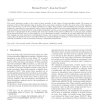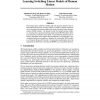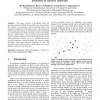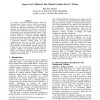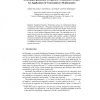1316 search results - page 7 / 264 » Comparing mathematical models on the problem of network infe... |
124
click to vote
AUTOMATICA
2008
15 years 1 months ago
2008
This article introduces results on the control of gene networks, in the context of piecewise-affine models. We propose an extension of this well-documented class of models, where ...
136
click to vote
NIPS
2000
15 years 3 months ago
2000
The human figure exhibits complex and rich dynamic behavior that is both nonlinear and time-varying. Effective models of human dynamics can be learned from motion capture data usi...
ICAI
2008
15 years 3 months ago
2008
- This paper presents a distributed model for detecting Activities of Daily Living (ADLs) in a home setting. We consider an environment where household devices and utensils are aug...
95
Voted
AAAI
1998
15 years 3 months ago
1998
We present a noisy-OR Bayesian network model for simulation-based training, and an efficient search-based algorithm for automatic synthesis of plausible training scenarios from co...
204
click to vote
CP
2009
Springer
16 years 2 months ago
2009
Springer
Equidistant Frequency Permutation Arrays are combinatorial objects of interest in coding theory. A frequency permutation array is a type of constant composition code in which each ...
